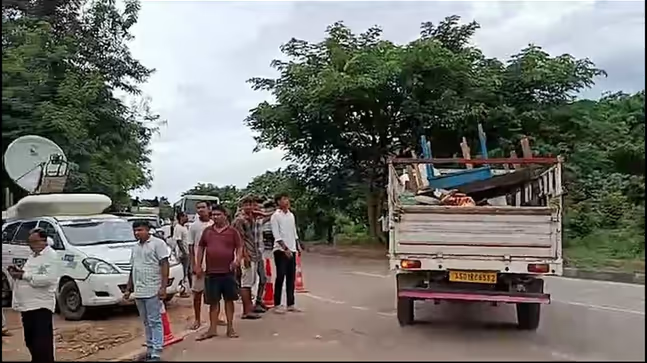In Assam’s Sonapur, a number of families have vacated their homes in Kachutali following an administrative directive to relocate. The eviction, which had been a topic of heated discussion for weeks, saw families gather their belongings, pack them into vehicles, and move to alternative sites. The sight of these families leaving with their household items, some carrying traditional goods tied to their cultural roots, paints a poignant picture of displacement in the name of development.
The administrative directive comes in the wake of what officials describe as illegal encroachments on government land. According to the local authorities, the eviction is necessary to reclaim the land for developmental projects. This directive has sparked both sympathy and anger from various corners of society. Some have called it a much-needed step to clear encroachments, while others argue that the move lacks adequate planning, leaving many families with little time or support to relocate.
Among the evictees are those who have lived in the area for years, if not decades. For them, this land is more than just a place to live; it holds memories, cultural ties, and a sense of belonging. Many of the items being loaded into trucks and vans are not just everyday household goods but traditional artifacts passed down through generations, connecting them to their history. The emotional toll of leaving their homes is evident on the faces of those being displaced, with many unsure of what the future holds.
Local officials, while acknowledging the difficult situation, have maintained that the eviction was necessary. They argue that the encroachment on government land has been an ongoing issue, and in order to move forward with planned projects, the area needed to be cleared. In response to the growing criticism, an official stated, “We understand that this is a sensitive matter, but the law must be upheld. We have followed all legal procedures and issued the necessary notices in advance.” He also noted that alternative accommodations had been suggested for those affected, though it remains unclear if all the evictees have been provided with a viable alternative.
The process of eviction, however, has not been without its challenges. Some families resisted, expressing their dissatisfaction with the government’s decision. Others, resigned to their fate, quietly complied with the directive. What remains common among all is a sense of uncertainty, as the new locations being suggested are often far from their current livelihoods, schools, and social networks. The logistical challenges of relocating, especially with children and elderly family members, have compounded the difficulties.
Community leaders and local activists have stepped in to voice their concerns about the process. They argue that while development is essential, it should not come at the cost of people’s homes and their sense of security. One activist, present during the eviction process, remarked, “Development should be inclusive. The government must take responsibility for ensuring that these families are not left in limbo. We cannot ignore the human cost of these actions.”
As the eviction process continues, many of the displaced families are still trying to figure out their next steps. Some have moved to temporary shelters provided by relatives or have taken whatever space they could find in nearby villages. For them, the future is filled with uncertainties. The government, meanwhile, has assured that those affected will be looked after and compensated according to the law. But for the families, compensation is often more than just financial—it is about rebuilding a life from scratch in unfamiliar surroundings.
The situation in Sonapur reflects a larger, ongoing tension between development and displacement that is not unique to Assam. As the state pushes forward with its plans for modernization and infrastructure growth, more such cases are likely to arise. The challenge remains in finding a balance between reclaiming land for development and ensuring that those who are displaced are treated with dignity, respect, and fairness.
As the trucks continue to roll out of Kachutali, filled with the remnants of homes that once were, the eyes of many will remain on the government to see how it follows through on its promises. The evictees, now scattered across new and unfamiliar locations, hope for stability amidst the disruption that has upended their lives.

